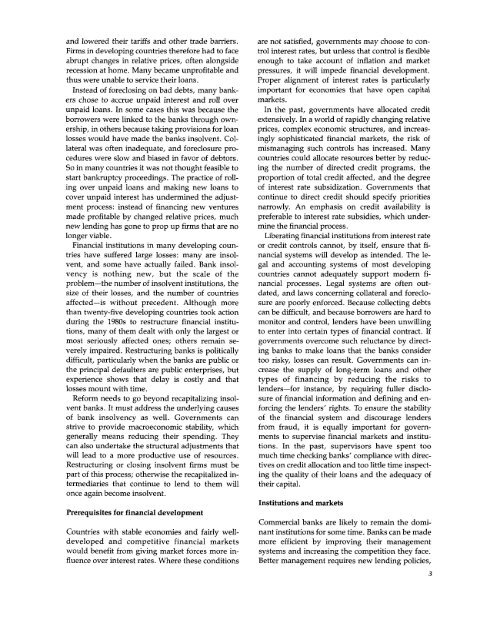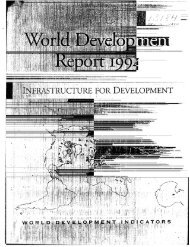Financial systems and development
Financial systems and development
Financial systems and development
Create successful ePaper yourself
Turn your PDF publications into a flip-book with our unique Google optimized e-Paper software.
<strong>and</strong> lowered their tariffs <strong>and</strong> other trade barriers. are not satisfied, governments may choose to con-<br />
Firms in developing countries therefore had to face trol interest rates, but unless that control is flexible<br />
abrupt changes in relative prices, often alongside enough to take account of inflation <strong>and</strong> market<br />
recession at home. Many became unprofitable <strong>and</strong> pressures, it will impede financial <strong>development</strong>.<br />
thus were unable to service their loans.<br />
Proper alignment of interest rates is particularly<br />
Instead of foreclosing on bad debts, many bank- important for economies that have open capital<br />
ers chose to accrue unpaid interest <strong>and</strong> roll over markets.<br />
unpaid loans. In some cases this was because the In the past, governments have allocated credit<br />
borrowers were linked to the banks through own- extensively. In a world of rapidly changing relative<br />
ership, in others because taking provisions for loan prices, complex economic structures, <strong>and</strong> increaslosses<br />
would have made the banks insolvent. Col- ingly sophisticated financial markets, the risk of<br />
lateral was often inadequate, <strong>and</strong> foreclosure pro- mismanaging such controls has increased. Many<br />
cedures were slow <strong>and</strong> biased in favor of debtors. countries could allocate resources better by reduc-<br />
So in many countries it was not thought feasible to ing the number of directed credit programs, the<br />
start bankruptcy proceedings. The practice of roll- proportion of total credit affected, <strong>and</strong> the degree<br />
ing over unpaid loans <strong>and</strong> making new loans to of interest rate subsidization. Governments that<br />
cover unpaid interest has undermined the adjust- continue to direct credit should specify priorities<br />
ment process: instead of financing new ventures narrowly. An emphasis on credit availability is<br />
made profitable by changed relative prices, much preferable to interest rate subsidies, which undernew<br />
lending has gone to prop up firms that are no mine the financial process.<br />
longer viable.<br />
Liberating financial institutions from interest rate<br />
<strong>Financial</strong> institutions in many developing coun- or credit controls cannot, by itself, ensure that fitries<br />
have suffered large losses: many are insol- nancial <strong>systems</strong> will develop as intended. The levent,<br />
<strong>and</strong> some have actually failed. Bank insol- gal <strong>and</strong> accounting <strong>systems</strong> of most developing<br />
vency is nothing new, but the scale of the countries cannot adequately support modern fiproblem-the<br />
number of insolvent institutions, the nancial processes. Legal <strong>systems</strong> are often outsize<br />
of their losses, <strong>and</strong> the number of countries dated, <strong>and</strong> laws concerning collateral <strong>and</strong> forecloaffected-is<br />
without precedent. Although more sure are poorly enforced. Because collecting debts<br />
than twenty-five developing countries took action can be difficult, <strong>and</strong> because borrowers are hard to<br />
during the 1980s to restructure financial institu- monitor <strong>and</strong> control, lenders have been unwilling<br />
tions, many of them dealt with only the largest or to enter into certain types of financial contract. If<br />
most seriously affected ones; others remain se- governments overcome such reluctance by directverely<br />
impaired. Restructuring banks is politically ing banks to make loans that the banks consider<br />
difficult, particularly when the banks are public or too risky, losses can result. Governments can inthe<br />
principal defaulters are public enterprises, but crease the supply of long-term loans <strong>and</strong> other<br />
experience shows that delay is costly <strong>and</strong> that types of financing by reducing the risks to<br />
losses mount with time. lenders-for instance, by requiring fuller disclo-<br />
Reform needs to go beyond recapitalizing insol- sure of financial information <strong>and</strong> defining <strong>and</strong> envent<br />
banks. It must address the underlying causes forcing the lenders' rights. To ensure the stability<br />
of bank insolvency as well. Governments can of the financial system <strong>and</strong> discourage lenders<br />
strive to provide macroeconomic stability, which from fraud, it is equally important for governgenerally<br />
means reducing their spending. They ments to supervise financial markets <strong>and</strong> institucan<br />
also undertake the structural adjustments that tions. In the past, supervisors have spent too<br />
will lead to a more productive use of resources. much time checking banks' compliance with direc-<br />
Restructuring or closing insolvent firms must be tives on credit allocation <strong>and</strong> too little time inspectpart<br />
of this process; otherwise the recapitalized in- ing the quality of their loans <strong>and</strong> the adequacy of<br />
termediaries that continue to lend to them will their capital.<br />
once again become insolvent.<br />
Institutions <strong>and</strong> markets<br />
Prerequisites for financial <strong>development</strong><br />
Commercial banks are likely to remain the domi-<br />
Countries with stable economies <strong>and</strong> fairly well- nant institutions for some time. Banks can be made<br />
developed <strong>and</strong> competitive financial markets more efficient by improving their management<br />
would benefit from giving market forces more in- <strong>systems</strong> <strong>and</strong> increasing the competition they face.<br />
fluence over interest rates. Where these conditions Better management requires new lending policies,<br />
3
















